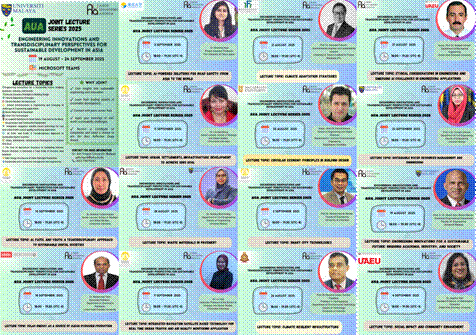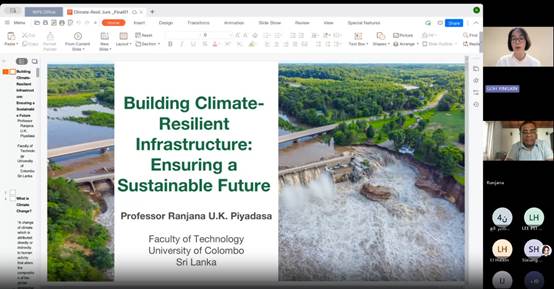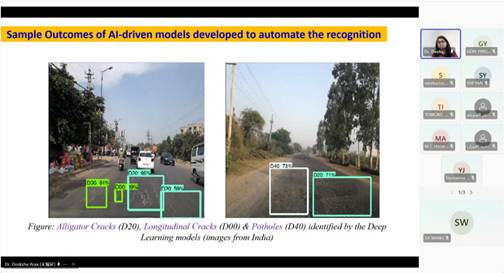Co-organized by Universiti Malaya and Asian Universities Alliance (AUA), the AUA Joint Lecture Series 2025 was successfully held from August 19 to September 24, 2025, under the theme “Engineering Innovations and Transdisciplinary Perspectives for Sustainable Development in Asia.” This flagship academic program brought together a distinguished lineup of 14 professors from 6 AUA member universities, who delivered insightful lectures, and enrolled 52 enthusiastic students from diverse academic backgrounds. Upon the conclusion of this program, 19 students earned program certificates for their active engagement and completion of requirements, while 6 outstanding participants were honored with awards in recognition of their exceptional essays, marking a fruitful convergence of knowledge sharing and talent development.

The lecture series was structured into multiple sub-themes which were a comprehensive exploration of sustainable development, each sub-theme strategically designed to delve into critical facets of sustainable development by integrating cutting-edge engineering expertise with transdisciplinary methodologies. Every lecture offered a unique lens to examine how innovative solutions and collaborative strategies can effectively address the pressing sustainable development challenges in Asia, with renowned professors leading each lecture to share their in-depth specialized knowledge and practical insights.
Redesigning Sustainable Systems: Macro and Life-Cycle Perspectives
Two pivotal lectures focused on reimagining sustainable systems from a holistic macro and life-cycle standpoint. Prof. Abdul Aziz Abdul Raman of Universiti Malaya emphasized the imperative of bridging the gap between academia, industry, and society. He argued that such collaboration is the cornerstone for driving impactful sustainable innovation, as it aligns theoretical research with real-world industrial needs and societal demands. Prof. Ferhat Karaca from Nazarbayev University approached sustainable innovation from an economic lens. He specifically applied circular economy principles to building design and illustrated how to optimize resource use and reduce waste.
Addressing Climate Adaptation: Building Resilience Against Climate Impacts
Another key aspect of the program sessions was centered on strengthening both societal and physical resilience to mitigate the adverse effects of climate change. Prof. Kensuke Fukushi from the University of Tokyo kicked off this module by discussing overarching strategies for climate adaptation. He covered topics such as policy formulation, regional cooperation, and the integration of climate risk assessment into long-term development planning, providing a broad framework for addressing climate-related challenges. Building on this, Prof. Ranjana Udaya Kumara Piyadasa from the University of Colombo delved into the technical aspects of climate adaptation. He detailed the engineering of climate-resilient infrastructure, including the design of flood-resistant buildings, drought-tolerant water supply systems, and heat-resilient urban landscapes, offering practical engineering solutions to enhance infrastructure’s ability to withstand extreme climate events.

Prof. Ranjana Udaya Kumara Piyadasa, University of Colombo
Sustainable Management of Critical Resources: Water, Energy, and Waste
The sustainable management of vital resources—water, energy, and waste—formed a core pillar of the lecture series, reflecting their significance in achieving sustainable development goals (SDGs). Prof. Faridah Othman from Universiti Malaya focused on sustainable water resources management—a topic closely aligned with SDG 6. She explored innovative approaches to water conservation, wastewater recycling, and equitable water distribution, addressing the growing water scarcity issues faced by many regions in Asia. Dr. Muhammad Tahir and Dr. Suhana Binti Koting both contributed valuable insights into resource utilization. Dr. Tahir from the United Arab Emirates University discussed the potential of solar energy as a clean and renewable source for hydrogen production, highlighting its role in transitioning to a low-carbon energy system. Dr. Koting from Universiti Malaya, on the other hand, explored the innovative use of waste materials in pavement construction, demonstrating how repurposing industrial and construction waste can reduce landfill burden and promote a circular economy in the construction sector.
Technological Innovation and Smart Solutions for Urban Management
The series also shone a spotlight on the transformative role of technological innovation and smart solutions in enhancing urban management and sustainability. Prof. Mohammed Ali Berawi from Universitas Indonesia provided a comprehensive overview of the role of smart city technologies. He stressed that smart features and services should serve as part of Smart City initiatives which require the development of three forces: hardware, software and brainware. Dr. Deeksha Arya from the University of Tokyo presented AI-powered solutions specifically tailored for enhancing road safety. Prof. Lin Yola from Universitas Indonesia introduced satellite-based technology for real-time urban monitoring, highlighting its applications in tracking urban sprawl, monitoring air quality, and managing natural disasters. Expanding the perspective further, Dr. Lita Sari Barus from Universitas Indonesia linked technological innovation in urban infrastructure development to the achievement of SDGs. She emphasized that smart urban planning and infrastructure projects must be aligned with SDGs to ensure that urbanization contributes to sustainable development rather than exacerbating environmental and social challenges.
Ethics, Governance, and Transdisciplinary Collaboration: Beyond Technical Aspects
In a bid to provide a holistic understanding of sustainable development, three professors transcended technical discussions to explore the critical non-technical dimensions of ethics, governance, and transdisciplinary collaboration. Dr. Jogymol Alex from the United Arab Emirates University stressed the importance of social impact and community engagement in sustainable development initiatives. She aimed to show how education, particularly mathematics education, builds the human infrastructure necessary for sustainability. Dr. Waleed Ahmed from the United Arab Emirates University delved into ethical considerations in engineering and AI, discussing how codes of ethics could guide principles for engineers and promote sustainability in engineering. Dr. Solikhah Yuliatiningtyas from Universitas Indonesia emphasized the power of cross-disciplinary collaboration by proposing a transdisciplinary approach that integrates AI, faith, and youth.

Dr. Deeksha Arya, Assistant Professor, The University of Tokyo
The AUA Joint Lecture Series 2025 received overwhelmingly positive feedback from participants, who praised the depth, diversity, and practical relevance of the topics covered. Dong Haoran, a second-year student from Tsinghua University who was awarded the “Best Essay” prize, shared his reflections: “This lecture series has significantly broadened my understanding of how economic policies and engineering innovations can synergize to advance sustainable development in Asia. It has made me realize the necessity of breaking down disciplinary barriers and combining the ‘soft power’ of economic management with the ‘hard power’ of engineering to deliver effective, comprehensive solutions.” He also commended the AUA program for its inclusivity and excellent organization, noting that it facilitated meaningful cross-cultural exchanges and interdisciplinary dialogue among participants from different countries and academic backgrounds.
Overall, the AUA Joint Lecture Series 2025 served as a valuable platform for knowledge exchange and capacity building. It fostered a deeper understanding among participants of how engineering innovations and transdisciplinary collaboration can be harnessed to address Asia’s most pressing sustainability challenges. Equipped with new insights and practical approaches, participants made the AUA Joint Lecture Series 2025 a resounding success in advancing the AUA’s mission of promoting academic collaboration and sustainable development in Asia.
Full recordings of all sessions are available on the AUA official website: http://www.asianuniversities.org/lectureseries/
Writer: XIE Renjie
Editor: CAI Xiaodan
